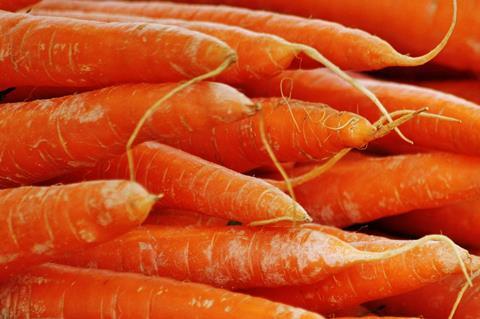Could an ordinary carrot improve the treatment of type 2 diabetes? A new study from University of Southern Denmark (SDU) suggests so. The researchers found that carrots can enhance the body’s ability to regulate blood sugar and positively influence the composition of gut bacteria.

Type 2 diabetes affects millions worldwide, with numbers on the rise in Denmark and globally. In Denmark alone, the number of cases has more than quadrupled since 1996.
Treatment typically involves dietary changes and medication, though many people experience side effects from common pharmaceuticals. According to researchers from SDU, Odense University Hospital, and the University of Copenhagen, who collaborated on the recently published study, carrots could offer a natural and potentially side-effect-free way to complement existing treatments.
Blood sugar and gut bacteria
Researchers studied the effects of carrots over 16 weeks using mice induced with type 2 diabetes. The mice were placed on a high-fat diet to mimic an unhealthy human lifestyle. They were divided into two groups: one received a diet supplemented with 10% freeze-dried carrot powder, while the other received a diet without carrots. Both diets were calorie-matched, ensuring the only variable was the bioactive compounds in the carrots. Results showed that the group receiving carrot powder exhibited improved blood sugar regulation, as measured by glucose tolerance tests.
READ MORE: Mediterranean diet changes gut bacteria, boosting memory and cognition
READ MORE: Dietary fibers make our gut bacteria behave healthily
A glucose tolerance test measures how well the body regulates blood sugar after consuming a specified amount of sugar. In this study, mice were given a sugar solution, and their blood sugar levels were measured over time.
”Our study showed that carrots altered the composition of the gut microbiome – the billions of microorganisms living in the gut that play a crucial role in digestion and health. Mice consuming carrots exhibited a healthier balance of gut bacteria,” explains project coordinator Morten Kobæk Larsen, associate professor at the Department of Clinical Research, SDU.
Short-chain fatty acids
Additionally, these mice had more bacteria that produce short-chain fatty acids (SCFAs). These small molecules formed when bacteria break down dietary fibres, help regulate energy metabolism and blood sugar while supporting gut health.
“Everything we eat affects the composition of gut bacteria,” Larsen elaborates.
”Consuming carrots shifts the gut bacteria towards a healthier balance, benefiting mice with type 2 diabetes.”
Bioactive compounds
Carrots contain bioactive compounds that enhance cells’ ability to absorb sugar, thereby aiding blood sugar regulation. These bioactive substances, derived from unsaturated fatty acids, are also present in other vegetables from the carrot family, such as parsley, celery, and parsnips.
“We see carrots as a potential component of future dietary strategies for type 2 diabetes, says Lars Porskjær Christensen, professor of analytical chemistry and natural product chemistry at the Department of Physics, Chemistry, and Pharmacy, SDU.
“Other vegetables in the carrot family might have similar properties.”
Implications for humans
The researchers are cautious about directly applying their findings to humans.
”Our study used an animal model, and the next step is to conduct clinical trials, they explain.
”Such studies are costly, and we are working to secure external funding to conduct a smaller clinical trial with carrots containing relatively high amounts of bioactive compounds. This could pave the way for larger clinical studies including studies in animals with purified bioactive compounds and thereby substantiate the preventive effects of carrots against type 2 diabetes,” says Christensen.
Preliminary findings from a similar study on carrots’ effects on colon cancer suggest that as little as 30–40 grams of raw or lightly cooked carrots daily could have beneficial effects.
According to the researchers, the concentration of bioactive compounds varies widely among carrot varieties. However, the right variety can provide sufficient doses of these compounds without needing concentrated products. For example, the ‘Night Bird’ variety, a purple carrot, contains relatively high concentrations of bioactive substances.
Preparation matter
Cooking impacts the amount of health-promoting substances, but they do not disappear entirely.
”Even with prolonged frying or boiling, some bioactive compounds remain. However, raw or lightly cooked carrots seem to be the best option to retain as many beneficial compounds as possible,” Christensen advises.
The study is published in Clinical and Translational Science. Read more here: https://ascpt.onlinelibrary.wiley.com/doi/10.1111/cts.70090
Factfile
- Bioactive compounds are organic chemicals of biological origin that influence physiological processes. Many are derived from plants and fungi and can have either beneficial or harmful effects on humans. Some bioactive compounds from plants and fungi are used in medicines, while others in plant-based foods are believed to promote health and prevent diseases. Their effects depend on mechanisms of action, bioavailability, and concentration in food, which can vary by crop variety, cultivation, and processing.
- The main bioactive compounds in carrots are falcarinol and falcarindiol, which the vegetable produces to defend against fungal infections. Besides their antifungal properties, these compounds have antibacterial, anti-inflammatory, and cytotoxic effects.
- The study was conducted using 54 mice and funded by the Odense University Hospital Research Fund. The carrots used were organically grown by a Danish producer.
- As of 2022, approximately 350,000 people in Denmark lived with diabetes, 89% of whom had type 2 diabetes. Globally, over half a billion people have diabetes, with type 2 diabetes rates increasing in most countries. This rise is attributed to lifestyle changes, increased obesity rates, and an ageing population.







No comments yet